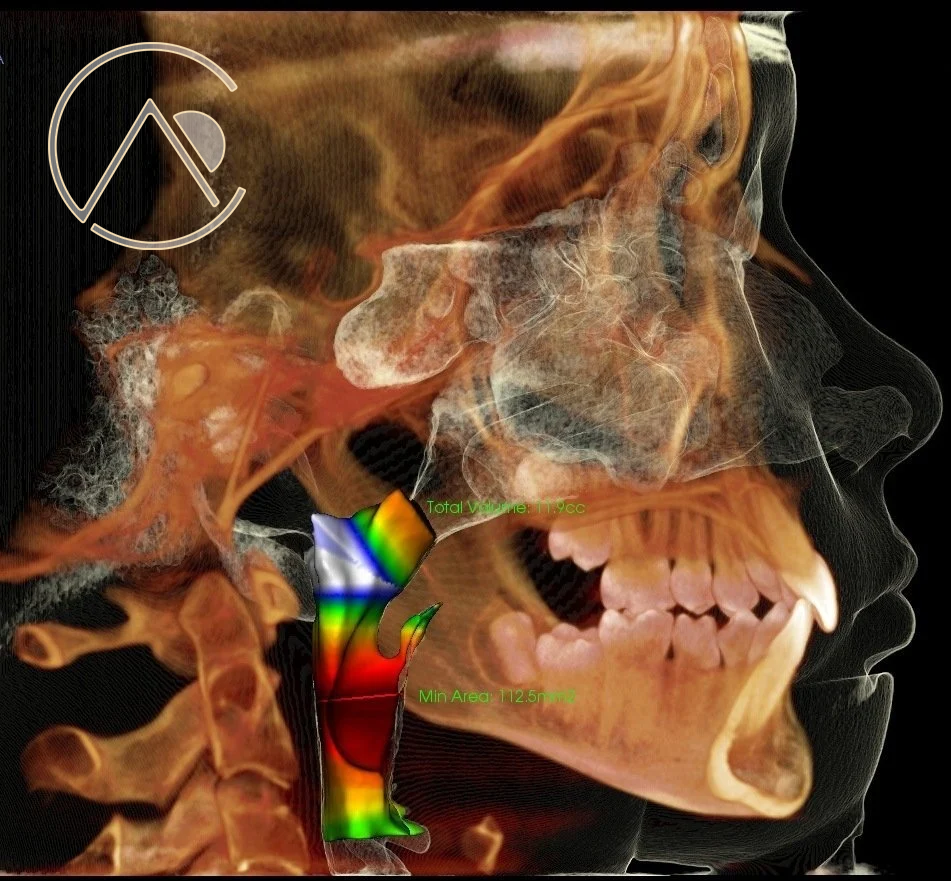
A small or narrow upper jaw is often behind some of the common orthodontic problems Dr. Cronin and I treat, including crowded top teeth and crossbites. But, did you know, aside from the appearance of your smile, the size of your jaw can also have a direct effect on your overall health and wellbeing?
Research shows a small jaw is tied to:
-
Stuffy Noses and Sinus Issues
Your palate (the roof of the mouth), which is part of the bone that forms the upper jaw, called the maxilla, is the base of your nose. Yup, that means when the upper jaw or palate is narrow, the floor of the nose is also narrow.
A narrow nasal cavity makes you more susceptible to stuffy noses and sinus issues. It also interferes with your ability to properly breathe through your nose in general.
Nasal breathing is actually incredibly important. In a review published in Current Trends in Otolaryngology and Rhinology, the authors noted that nasal breathing gives us our sense of smell, enhances oxygen absorption by the lungs, filters out impurities and humidifies and warms the air we breathe. It’s also crucial for craniofacial development, head posture, TMJ function and more.
-
Mouth Breathing
If you can’t breathe out of your nose properly, you’re forced to breathe out of your mouth. Mouth breathing is fine when you’re doing intense exercise or you have the occasional cold. But when it’s chronic, it becomes a huge problem. And since mouth breathing usually happens at night during sleep, people often don’t notice that they or their child are even doing it.
When you’re constantly breathing through your mouth, the body has to compromise to ensure there is enough oxygen in the blood at the expense of other biological functions. This can cause a host of consequences, including sleep-disordered breathing.
In young children who are still growing, mouth breathing and jaw development are a double-edged sword. Nasal obstruction from a small upper jaw can cause mouth breathing, but mouth breathing can also cause a small upper jaw and nasal obstruction, as well as other skeletal changes.
Chronic mouth breathers frequently develop a long, narrow face, receding chin and narrow dental arch. As the permanent teeth erupt, crowding, a crossbite and poor tongue posture are then much more likely.
-
Sleep-Disordered Breathing, Including Obstructive Sleep Apnea
There are a number of different causes of sleep apnea and other types of sleep-disordered breathing like upper airway resistance syndrome. But the mouth breathing we talked about above is a big one.
With a small upper jaw, there isn’t enough room for the tongue to rest in the proper position. It can sit lower and further back than it should. Kids and adults may also have weakened oral muscles. The tongue and lax tissues can then obstruct the airway during sleep, temporarily stopping breathing, which is called obstructive sleep apnea.
Sleep-disordered breathing causes poor quality sleep, decreased oxygen intake, which stresses internal organs, including the brain, and constant adrenaline surges during sleep.
In adults, sleep apnea produces symptoms, including:
- Daytime fatigue
- Concentration difficulties
- Cognitive impairment
- Decreased libido
- Depression
It also significantly increases the risk for:
- Diabetes
- Heart disease
- High blood pressure
- Stroke
In kids, the symptoms of sleep-disordered breathing are different. Unlike adults whose first sign there is a problem is fatigue, kids tend to get hyperactive instead. The sleep deprivation and reduced oxygen intake can cause:
- Bedwetting
- Loss of appetite
- Lack of focus
- Behavioral problems, including aggression
- Increased risk of attention deficit hyperactivity disorder (ADHD)
- Headaches
- Poor school performance
-
Disrupted Stress Response
Stanford researchers published a study in the journal BioScience exploring the epidemic of health conditions caused by small jaws. One of the many interesting topics covered was stress.
Stress interrupts sleep but poor quality and quantity of sleep caused by sleep-disordered breathing also causes stress, creating a dangerous feedback system.
The authors said that this results “in more or less constant sympathetic arousal.” With the body’s stress response chronically activated, it takes a toll on physical, emotional and psychological health.
-
Jaw Pain and Temporomandibular Joint (TMJ) Dysfunction
The teeth and jaw are part of your larger dental and facial system, which also includes the lips, tongue, facial muscles and temporomandibular joints. When one component is off, such as in the case of a too-small upper jaw, it throws everything else off too.
This bite imbalance puts stress on the TMJ and jaw, potentially causing jaw pain, discomfort and TMJ disorders. It also increases your risk for teeth grinding and clenching (bruxism), which makes the pain and dysfunction even worse.
-
Neck Pain and Headaches
Speaking of bruxism and TMJ disorders, both problems can cause headaches on their own. Combined with airway obstruction and malocclusion (a bad bite) from a small jaw, things can get pretty painful.
The review published in Current Trends in Otolaryngology and Rhinology I talked about earlier noted that people with an obstructed airway commonly have a forward head posture. Holding the head forward stresses the cervical spine and neck muscles, causing pain and, over time, nerve compression and spinal issues.
Another study in the Journal of Oral Rehabilitation of patients with TMJ disorder and airway resistance syndrome (a form of sleep-disordered breathing) also found most had a forward head posture and suffered from neck pain and headaches.
-
Inflammation
Many of the issues on this list, including sinus problems, sleep deprivation from sleep-disordered breathing, TMJ disorder and bruxism can contribute to persistent inflammation.
When teeth are crowded because of a small jaw and narrow dental arch, it may exacerbate the issue. Because crowded teeth are harder to effectively clean, you have a higher risk of developing tooth decay and periodontal disease, or gum disease.
According to a 2019 article in Disease-A-Month Journal, “As periodontal disease works on the same chronic inflammation model seen in systemic diseases, there is sufficient evidence to suggest a bi-directional link between the two.” In basic terms, this means gum disease is tied to other inflammatory health conditions, including heart disease, respiratory disease, diabetes and stroke.
The Good News? All of These Issues are Preventable
Now that I’ve probably freaked you out, let’s talk about the bright side. There have been so many advancements in airway-focused orthodontics. At Cronin & Czarnik Orthodontics, we use different techniques to widen the upper jaw in order to prevent, intercept or treat malocclusion and the related airway and breathing problems.
In children and younger teens, the two halves of the maxilla aren’t fused yet. So we can use a Schwartz appliance or other palate expander to push the halves apart and expand the jaw. Eventually, new bone forms in the center, stabilizing the expansion. This can lead to significant improvements in quality of life.
Starting treatment when kids still have some of their baby teeth ensures when the permanent teeth come in, they’ll have enough room to erupt centered in the bone. This means less crowding and avoiding the need for extractions or surgical correction.
As for adults, while in the past palatal expansion wasn’t possible without orthognathic surgery (jaw surgery), that’s changing. Dr. Cronin and I offer a cutting-edge, non-surgical technique known as maxillary skeletal expansion (MSE), also called miniscrew-assisted rapid palatal expansion (MARPE), for certain cases.
We place a palatal expander and secure it with temporary implants in the palate. We do all of this in the office with just local anesthesia. The expander widens the upper jaw to treat a crossbite, crowding and other types of malocclusion with the benefit of also being a minimally invasive form of obstructed airway treatment.
Airway Orthodontics in Westminster, Colorado
Ready to find out how airway treatment and palatal expansion can help you breathe easier and smile more confidently? Book a complimentary consultation at Cronin & Czarnik Orthodontics today! Our practice serves patients of all ages in Westminster, Arvada, Denver and the surrounding areas using state-of-the-art technology and evidence-based techniques.

